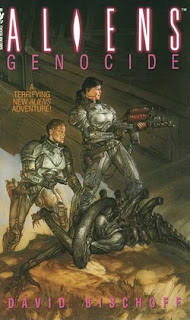Through their blog, the 28-year-old New Jersey native tackles topics that vary wildly between more staid fare such as the value of reading old science fiction, to more incendiary ideas such as the role that military science fiction has played in rationalizing genocide. Their work tends to be engaging, interesting, well-reasoned, and highly readable.
 |
| In an insightful blog post, Collins points out that military SFF sometimes wears its pro-genocide politics on its sleeve. (Image via goodreads) |
Examining older works in context is one of Collins’ ongoing projects. Each of these reviews — which they publish almost every week — discuss the author’s background, where the work fits into the author’s career, what the publishing magazine was like at the time, etc. Opting for a more conversational style, Collins peppers their writing with asides and interesting digressions. Some highlights include Brian Aldiss’ Hothouse (short story), Damon Knight’s Earth Quarter, and Wyman Guin’s Beyond Bedlam.
Collins wears their politics on their sleeve, and reads through an intersectional lens. Though they’re agnostic, there’s a subtext of liberation theology that runs through much of their analysis — which makes sense given that they took a minor in religious studies while pursuing film studies at Elon University. When discussing the work of Manly Wade Wellman, for example, Collin’s examination of the Angolan-born author’s character and contradictory career add richness to the interpretation of the story.
Brian Collins writes fearlessly, expressing opinions that seem heartfelt even when they go against the public consensus. Some of their iconoclasm can likely be chalked up to the hotheadedness of youth — but at the same time, this willingness to disregard tin gods can lead to interesting insight. This is most evident when they tackle more complex matters in their Observatory editorials. Their piece on Starship Troopers is one of our favourite critiques of Heinlein published in recent memory. To quote from the editorial:
“Starship Troopers is one of the most famous and misremembered “canonical” SF novels; and unfortunately, no matter how you look at it, it also set a horrible precedent from which the genre still has not recovered. It’s totally possible the genre will never recover from such an impact so long as there are creative minds in the field (and by extension likeminded readers) who believe in Heinlein’s argument: that sometimes extermination is the only option.”
Although they’re a relatively new voice in the SFF community, Brian Collins deserves consideration for the Hugo Award for Best Fan Writer. They’re a writer with a lot of talent, and we look forward to seeing what they do next.


